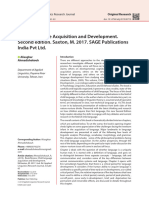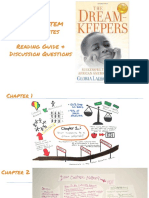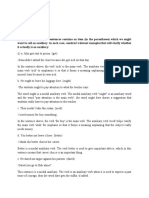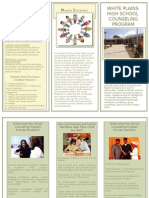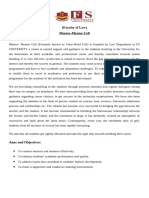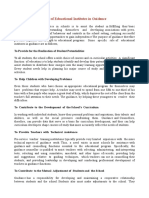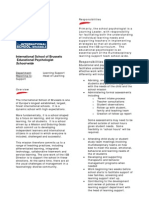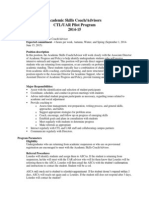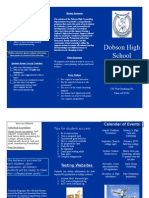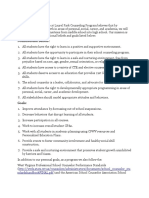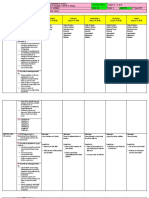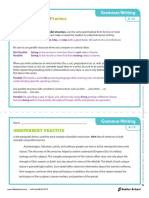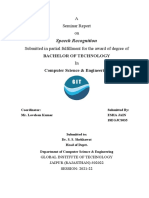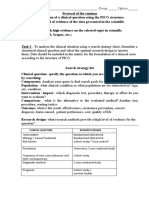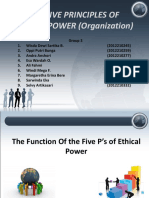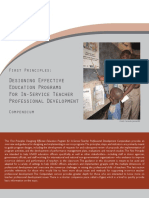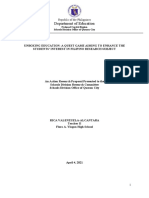Delivery Piece
Delivery Piece
Uploaded by
api-300688730Copyright:
Available Formats
Delivery Piece
Delivery Piece
Uploaded by
api-300688730Original Title
Copyright
Available Formats
Share this document
Did you find this document useful?
Is this content inappropriate?
Copyright:
Available Formats
Delivery Piece
Delivery Piece
Uploaded by
api-300688730Copyright:
Available Formats
Pressley Ridge Laurel Park
School Counseling Programs & Services 2015-2016
Mission Statement
The Pressley Ridge Laurel Park Counseling Program believes that by supporting
students growth in areas of personal, social, career, and academia, we will be promoting
positive transitions from elementary school and into high school. Our mission is
supported by our foundational beliefs and goals.
Foundational Beliefs
School counselors are leaders, collaborators, and advocates for all students.
All students have the right to learn in a positive and supportive environment.
All students have the opportunity to participate in their school counseling
program.
All students have the right to learn in a safe and nurturing environment, free
from prejudice based on race, age, gender, sexual orientation, or religious
affiliation.
All students have access to a variety of honors and elective courses.
All students deserve access to an education that provides 21st Century technology
skills.
All students have the right to developmentally appropriate programming in areas
of personal, social, career, and academic development.
Goals
Provide a safe and nurturing environment that promotes student growth
uninhibited by barriers and biases.
Improve attendance
Decrease behaviors that disrupt learning of all students
Increase participation in Honors courses.
Work to increase overall student GPAs
Work with all students in academic planning.
Collaborating with community to provide information about career aspirations
and development.
Provide events to foster community involvement and healthy social skill
construction.
Classroom Core Curriculum
As school counselors, appropriate student developmental is of our utmost concern. In
order to help facilitate proper student success, we have designed a classroom core
curriculum that includes academic, career, and personal/social development. This work
is grounded in the ASCA National Standards, reinforced by a systematic examination of
theory, research, and practice. The curriculum promotes the student competencies of
knowledge, skills, and attitudes that are suitable for middle school students.
ASCA National Model Domains
Personal/ Social
Aid students in acquiring knowledge of self (positive self-image)
Support during tough transition periods (5th to 6th, 8th to high school, etc.)
Help students learn how to properly recognize and express feelings
Determine which behavior is appropriate and which is inappropriate
Fostering the growth of interpersonal skills
Establishing effective communication
Increasing the students knowledge, and respect, of diverse cultural differences
within our society/the world
Aid with student understanding of basic safety and survival skills
Help to eliminate bullying on and off campus
Educate students on the dangers of illegal substance use/abuse
Demonstrating appropriate peer/social interactions within the school and in the
community (school counselors should strive to be proper role models within the
school and the community)
Academic Development
Support student success via study and test taking skills
Contributing to improvements in overall student attendance
Support for teachers and facility in their work with students
Improving the academic self-concept of all students (confidence and competence)
Application of time-management and task-management skills
Establishing challenging, yet appropriate, academic goals
Establish self-directed learning in students
Build an understanding of the importance of school success and how it relates to
future career and vocational opportunities
Increasing parent involvement in the education process
Career Development
Helping students begin to explore their postsecondary options (college and
career)
Increasing student employment readiness (working as a team, time management,
etc.)
Developing a positive attitude towards continued education and work
Aligning career goals to educational goals (selection of proper courses, awareness
of the material offered in said courses, etc.)
Engaging parents in the educational and career preparation of their child
Application of skills to achieve career goals (utilizing conflict-management skills,
etc.)
Methods of Delivery
Responsive Services- The purpose of responsive services is to address the needs
of students that have personal issues/conflicts that may threaten, or disrupt, their
academic, career, and personal/social development.
We, as the school
counselors, realize certain problems call for specific responses/intervention
techniques in order to properly resolve them. Careful selection of appropriate
response techniques is a critical process of the entire responsive service. This
component is available to all students, and may actually be initiated by students,
teachers, or parents after a review of data.
Consultation - School counselors consult with students, teachers, other faculty
members, community agencies, and parents to help students resolve their
personal problems more effectively. Potential workshops and programs include
parent workshops, community based organizations, and after school programs.
Individual and Group Counseling The counseling process allows students to
identify the problem solving process themselves, with the aid of the school
counselor, and therefore reinforces higher level thinking in order for them to take
appropriate action. Counseling is goal-focused and short-term in nature.
Crisis Response School counselors provide support to students in critical and
emergency situations. This includes intervention and requires a follow up to the
immediate needs of the student(s).
Referral In some cases, school counselors will refer a student, or group of
students to another professional trained with a specific focus in whatever
problem area they may be facing. Students might just need referred to
continue/enhance their education, however. Responses include: Referring a
student to mental health professionals or even simply referring a student to
employment and training programs in their area of interest.
You might also like
- Child Language Acquisition and Development SaxtonDocument3 pagesChild Language Acquisition and Development SaxtonWafaa Reda FahimNo ratings yet
- WFP Written Test DraftDocument2 pagesWFP Written Test DraftBolou Germain88% (8)
- Professional Dispositions of LearnersDocument6 pagesProfessional Dispositions of LearnersJohnny100% (1)
- Guidance ServicesDocument7 pagesGuidance ServicesJosephine Princess Ibanez SantosNo ratings yet
- Dreamkeepers Reading GuideDocument12 pagesDreamkeepers Reading Guideapi-32464113250% (4)
- Chapter 8 SyntaxDocument11 pagesChapter 8 SyntaxNurjannahNo ratings yet
- Counseling Program ComponentsDocument2 pagesCounseling Program Componentsapi-296690302No ratings yet
- MS CounselorDocument2 pagesMS CounselorFrancis A. BuenaventuraNo ratings yet
- School Counseling Policies and ProceduresDocument5 pagesSchool Counseling Policies and ProceduresmayethNo ratings yet
- BrochureDocument2 pagesBrochurePamela ClaireNo ratings yet
- Learning MentorDocument5 pagesLearning MentorChrist's SchoolNo ratings yet
- ECC ES Counselor Job DescriptionDocument3 pagesECC ES Counselor Job DescriptionFrancis A. BuenaventuraNo ratings yet
- Sumandeep Nursing College: Subject: Nursing Education TOPIC: GUIDANCE & CounsellingDocument20 pagesSumandeep Nursing College: Subject: Nursing Education TOPIC: GUIDANCE & CounsellingRoselineTigga100% (1)
- Comp Coun PRGDocument10 pagesComp Coun PRGapi-234943711No ratings yet
- Lunenburg Fred C. School Guidance and Counseling Services Schooling V1 N1 2010Document9 pagesLunenburg Fred C. School Guidance and Counseling Services Schooling V1 N1 2010Felice06No ratings yet
- Mentor - Mentee CellDocument2 pagesMentor - Mentee Cellrbgc1930No ratings yet
- Role of Educational Institutes in Guidance - NotesDocument3 pagesRole of Educational Institutes in Guidance - NotesDr. Nisanth.P.M100% (3)
- RolestatementDocument2 pagesRolestatementapi-257829203No ratings yet
- Standard 7Document6 pagesStandard 7api-335128593No ratings yet
- Measure Assignment WilliamsDocument5 pagesMeasure Assignment Williamsapi-256935407No ratings yet
- Sample Comprehensive School Counseling ProgramDocument39 pagesSample Comprehensive School Counseling ProgramLaura Witt75% (4)
- GC AccomplishmentDocument5 pagesGC AccomplishmentnovieNo ratings yet
- Response To Intervention: New Roles For School Social WorkersDocument4 pagesResponse To Intervention: New Roles For School Social WorkersYashaswini YashuNo ratings yet
- 629 Assignment 1Document6 pages629 Assignment 1Qaiser AminNo ratings yet
- Ed Psych Job DescriptionDocument3 pagesEd Psych Job DescriptionFrancis A. BuenaventuraNo ratings yet
- Assignment 2Document2 pagesAssignment 2Dhon ValeNo ratings yet
- School Counselling-1 (Covers Modules 1 & 2)Document39 pagesSchool Counselling-1 (Covers Modules 1 & 2)ishmeet sachdeva100% (1)
- Role StatementDocument2 pagesRole Statementapi-322121709No ratings yet
- School Counseling PhilosophyDocument2 pagesSchool Counseling Philosophyapi-529954655No ratings yet
- Quality Schools: A Combination of Choice Theory and The Competence-Based ClassroomDocument16 pagesQuality Schools: A Combination of Choice Theory and The Competence-Based ClassroomKinza ArifNo ratings yet
- Orientation PacketDocument9 pagesOrientation Packetstacyh1No ratings yet
- BrochureDocument2 pagesBrochureapi-285112958No ratings yet
- Comprehensive Program PowerPointDocument10 pagesComprehensive Program PowerPointJaraed ThomasNo ratings yet
- The Woden School Proactive Behaviour Support FrameworkDocument5 pagesThe Woden School Proactive Behaviour Support FrameworkTheWodenSchoolNo ratings yet
- Benefits of School Counseling Service1Document4 pagesBenefits of School Counseling Service1nancy vargheseNo ratings yet
- Orientation PacketDocument9 pagesOrientation Packetstacyh1No ratings yet
- School Counseling Program BrochureDocument2 pagesSchool Counseling Program Brochureapi-100341041No ratings yet
- Upward BoundDocument1 pageUpward BoundvivikademelNo ratings yet
- Personal Statement 2016Document1 pagePersonal Statement 2016api-333849174No ratings yet
- The Administration of Pupil Guidance and Discipline: Bambi Rose M. EspañolaDocument29 pagesThe Administration of Pupil Guidance and Discipline: Bambi Rose M. Españolabambi rose espanolaNo ratings yet
- Reflection in Guidance and CounselingDocument12 pagesReflection in Guidance and CounselingMarilyn CuaresNo ratings yet
- What Does The School Counselor DoDocument3 pagesWhat Does The School Counselor Doapi-264559333No ratings yet
- Career Guidance Toolkit Idahoe PDFDocument123 pagesCareer Guidance Toolkit Idahoe PDFpsychometrikNo ratings yet
- Habibullah Education AssignmentDocument11 pagesHabibullah Education AssignmentNasim ShahNo ratings yet
- Interview PresentationDocument12 pagesInterview PresentationSylvia ChrisNo ratings yet
- Jmms Middle School Counselor Brochure 2Document2 pagesJmms Middle School Counselor Brochure 2api-284642974No ratings yet
- Matthew K. Shervington-Jackson: Professional SummaryDocument3 pagesMatthew K. Shervington-Jackson: Professional Summaryapi-288478559No ratings yet
- Counseling Policy and ProcedureDocument13 pagesCounseling Policy and ProcedureJames Alex HabaradasNo ratings yet
- Adele Warren StatementDocument2 pagesAdele Warren Statementapi-567984134100% (1)
- Masinde Muliro University of Science and TechnologyDocument4 pagesMasinde Muliro University of Science and TechnologyKasyoka HildahNo ratings yet
- ENRochambeau School Counseling HandbookDocument19 pagesENRochambeau School Counseling HandbookSiangNo ratings yet
- Group Project 2022Document23 pagesGroup Project 2022api-696109851No ratings yet
- Director of Curriculum and InstructionDocument3 pagesDirector of Curriculum and Instructioncstern917No ratings yet
- Shepker CVDocument5 pagesShepker CVapi-353060939No ratings yet
- Edum 201 Output Group eDocument37 pagesEdum 201 Output Group eMarlen MagsinoNo ratings yet
- Inclusive Education AssessmentDocument3 pagesInclusive Education AssessmentDean Brando Mansinadez Cinco100% (1)
- Professional and Ethical Codes of Conduct in School CounselingDocument10 pagesProfessional and Ethical Codes of Conduct in School CounselingHK HSNo ratings yet
- What Is The Responsibility of TeachersDocument5 pagesWhat Is The Responsibility of TeachersJoannesNo ratings yet
- Job Description: Main Scale Teacher - ScienceDocument3 pagesJob Description: Main Scale Teacher - ScienceTerry Pinners100% (1)
- Support Learner Participation.: Code of Ethics For Professional TeachersDocument6 pagesSupport Learner Participation.: Code of Ethics For Professional TeachersMariedelNo ratings yet
- NLCS HCMC Ta - 2024-2025Document2 pagesNLCS HCMC Ta - 2024-2025israfeljutbaNo ratings yet
- Running Head: COUNSELING PROGRAM 1Document7 pagesRunning Head: COUNSELING PROGRAM 1Heather-Cate CodyNo ratings yet
- Belief Statement2-2Document6 pagesBelief Statement2-2api-285903956No ratings yet
- Divorce Group PaperDocument7 pagesDivorce Group Paperapi-300688730No ratings yet
- 2016 ResumeDocument1 page2016 Resumeapi-300688730No ratings yet
- Data Project PRLPDocument3 pagesData Project PRLPapi-300688730No ratings yet
- Completed FoundationDocument2 pagesCompleted Foundationapi-300688730No ratings yet
- Application of Jean Piaget S Cognition DDocument15 pagesApplication of Jean Piaget S Cognition Dbockarieabdul11162No ratings yet
- KINDERGARTEN-DLL Sasmple Week 11 (August 13-17, 2018) AsfDocument12 pagesKINDERGARTEN-DLL Sasmple Week 11 (August 13-17, 2018) AsfShen-shen Tongson Madreo-Mas MilladoNo ratings yet
- Parallel Structure Practice Activity Gr6 12Document1 pageParallel Structure Practice Activity Gr6 12Florie Anne ValdezNo ratings yet
- Speech Recognition: A Seminar Report OnDocument5 pagesSpeech Recognition: A Seminar Report OnNilesh SharmaNo ratings yet
- Task 1 - To Analyze The Clinical Situation Using A Search Strategy Sheet, Formulate ADocument3 pagesTask 1 - To Analyze The Clinical Situation Using A Search Strategy Sheet, Formulate AChristina WelgemoedNo ratings yet
- 00 THE FIVE PRINCIPLES OF ETHICAL POWER (OrganizationDocument11 pages00 THE FIVE PRINCIPLES OF ETHICAL POWER (OrganizationSabrung cimo100% (1)
- Curriculum-Map-Grade 10 COMPUTERDocument9 pagesCurriculum-Map-Grade 10 COMPUTERCarlaJaneOpadaManco100% (4)
- IPlan DLP Format v.02Document5 pagesIPlan DLP Format v.02Alvin Cuandot100% (1)
- Reading and WritingDocument4 pagesReading and WritingJelian MontenegroNo ratings yet
- 21 Theoretical Framework of The StudyDocument5 pages21 Theoretical Framework of The StudyRon AracoNo ratings yet
- Multi Store ModelDocument26 pagesMulti Store Modeltugbacetin6No ratings yet
- How Do Rubrics WorkDocument4 pagesHow Do Rubrics WorkoceanwatermanNo ratings yet
- Designing Effective PDDocument36 pagesDesigning Effective PDaspiredNo ratings yet
- ESP AssignmentDocument10 pagesESP Assignmentshin hye PaladinoNo ratings yet
- Critique Paper - Tejano, AMDocument4 pagesCritique Paper - Tejano, AMAnna TejanoNo ratings yet
- Implementing Strategies - Management & Operations IssuesDocument31 pagesImplementing Strategies - Management & Operations IssuesELMUNTHIR BEN AMMAR100% (1)
- PSEL August-December 2023Document51 pagesPSEL August-December 2023Lokesh PatelNo ratings yet
- Tracer Study of The Masters in Business Administration (MBA) Graduates From 2008-2012Document5 pagesTracer Study of The Masters in Business Administration (MBA) Graduates From 2008-2012apjeas100% (1)
- Dev Psych Unit 1 ReviewerDocument21 pagesDev Psych Unit 1 ReviewerAngel Joy PayasNo ratings yet
- Organizational CommunicationDocument44 pagesOrganizational CommunicationRadhiah Abu BakarNo ratings yet
- IELTS Reading Question Types Information Amp TipsDocument6 pagesIELTS Reading Question Types Information Amp TipsBrahim IdbendrissNo ratings yet
- Practical Viva QuestionsDocument4 pagesPractical Viva Questionsdasha.shripathyNo ratings yet
- Writing An Effective Escalation EmailDocument4 pagesWriting An Effective Escalation Emailrajverma10in2002No ratings yet
- An Approach To Regional Planning in India PDFDocument6 pagesAn Approach To Regional Planning in India PDFAshique V.VNo ratings yet
- Valenzuela Alcantara Action ResearchDocument16 pagesValenzuela Alcantara Action ResearchRICA VALENZUELA100% (1)
- 7th Grade Learning TargetsDocument6 pages7th Grade Learning TargetsShaun CarterNo ratings yet
